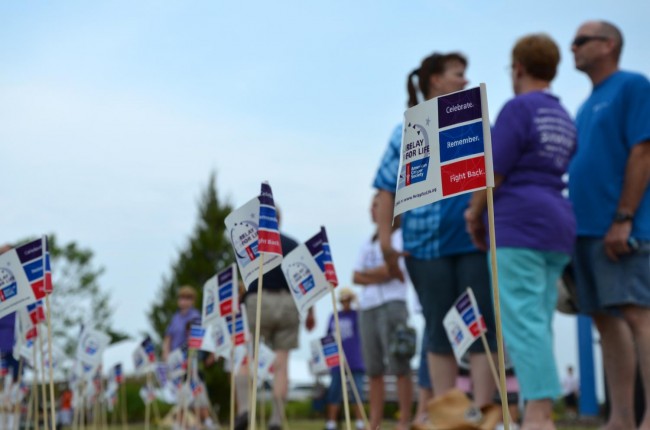
The oncologist Siddhartha Mukherjee describes cancer as a “shape-shifting disease of colossal diversity” in The Emperor of All Maladies, the book that won him the Pulitzer prize a few weeks ago, a disease when “dying, even more than death, defines the illness.” Some 600,000 Americans and 7 million people in the world will die of cancer this year, a disease with a human toll grimmer in a single year than most wars in history combined.
Click On:
- Relay For Life of Flagler
- On Unexpectedly Historic Night, Jacksonville Symphony Celebrates America in Palm Coast
- Tour de Goodwill: 460 Cyclists Set Off in Flagler Beach Rotary’s 8th Annual Ride
There are trillions of cells in a human body. Cells are life. They grow. They die. And some grow out of control. When that happens, they turn malignant. They turn into cancer cells. A description of cancer on a papyrus from 1600 B.C. describes breast cancer as “a bulging tumor . . . like touching a ball of wrappings,” or what Salman Rushdie three and a half millennia later called “the cruelty of God, because only a vicious deity would place death in the breast of a woman whose only dream was to suckle new life.” These days there’s chemotherapy, what Mukherjee describes as “a sanitized vision of hell.” But it’s no cure.
The drive to cure cancer has been elusive, the dead have not. Patients, Mukherjee despairs in The Emperor of All Maladies, keep taking that final journey, and will keep doing so for the foreseeable and long future. “But surely,” he writes, “it was the most sublime moment of my clinical life to have watched that voyage in reverse, to encounter men and women returning from that strange country— to see them so very close, clambering back.”
Because they do. Often, if not often enough, if not always for long enough.
Friday evening at Palm Coast’s Town Center, they were there in force, hundreds of them, cancer survivors, their families, their friends, strangers there out of solidarity, because there is no family—no American, no human being—who hasn’t in one way or another been affected by cancer.
It was the annual American Cancer Society’s Relay for Life, a gathering of 57 teams of three to 30 people each, who walked around Central Park’s pond in turns, for short bursts, for a few hours or all night, from early evening Friday to 10 a.m. this morning, in the culmination of a fund-raising drive that started last October and that was expected to raise considerable sums. “Last year we netted $100,000 for Relay in Flagler County,” local event chairman Frank Sockman said. “We should break that easily this year.”
Top teams included Aces Against Cancer ($6,970 raised at last count), Wild Oaks Eagles ($3,760), and Dominic’s Deli ($3,455). Leading individual fund-raisers include Mary Wildstein ($2,625), Mary Quinci-Suwinski ($2,230) and Tess Mitchell ($1,760). (See the complete list of teams and team members here.)
It was a carnival atmosphere, minus the sometimes overly commercial plasticity and crassness of these events: various organizations had set up their vendor tents to keep selling whatever goods they had for the fund-raiser. Behind them another ring of tents had gone up: tents where team members would sleep during the night, when they weren’t walking. There was food, music (including Matanzas High School’s steel drums ensemble), dancing, and to kick it all off a bit of prayer and inspirational talk from the organizers, and a few words from Palm Coast Mayor Jon Netts, County Commissioner Milissa Holland and Property Appraiser Jay Gardner.
Listen to Chuck Johnson’s Story[media id=204 width=250 height=100]
The kickoff highlight was Chuck Johnson’s story. He is a 59-year-old throat cancer survivor, diagnosed two years ago, and an employee at Sea Ray Boats (and its three-member team leader at Relay for Life). Speaking to the assembly from the stage, his voice breaking twice along the way, he described what the organization called A Road to Recovery has meant to him along the way: “Sue would be there with me day in and day out, day in and day out, and she’d listen to me and she’d take care of me, but as a caregiver, you have to realize how much your caregivers go through,” Johnson said. “They go through just as much as you do. She needs a break. So at two o’clock in the morning if I had to talk to somebody I could pick up the phone, I could call Road to Recovery and they would sit on that telephone, and they’d listen to me. They’d listen to me cry, they’d listen to me moan, they were very, very compassionate people.” He continued: “I have to tell you all, and I hope and pray that when I’m through working and retired, which hopefully will be just a few more years, that I have the strength, the energy, the courage, compassion and love that these people have, and I can be one of those people to help out in the road to recovery.”
Survivors then received medals, and the walk began.
Relay for Life Image Gallery
[nggallery id=57]






























Leave a Reply